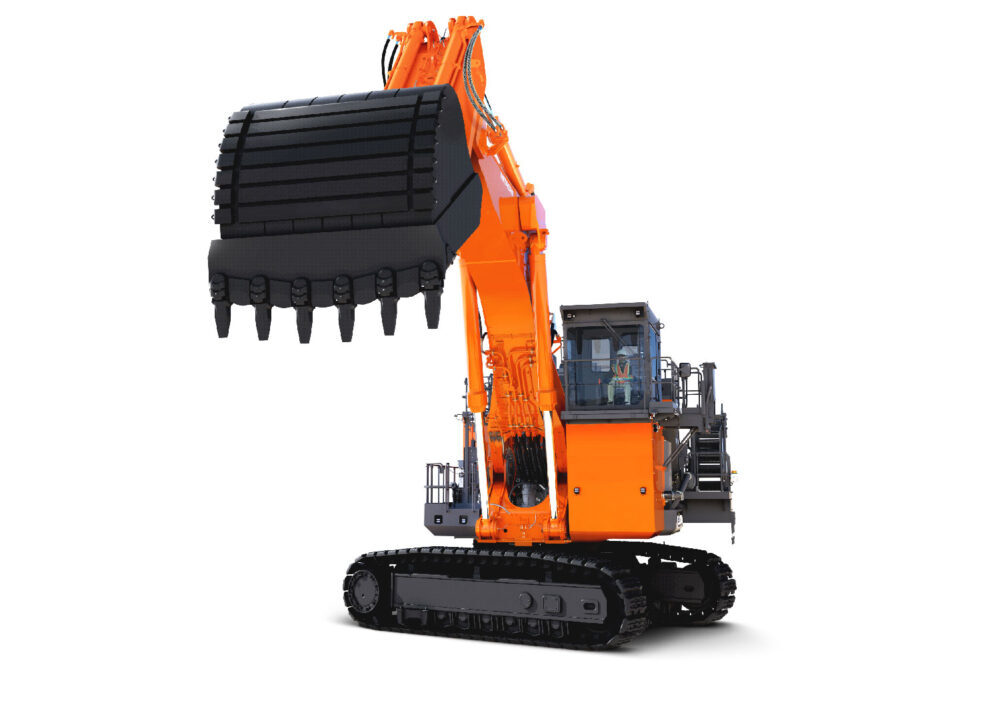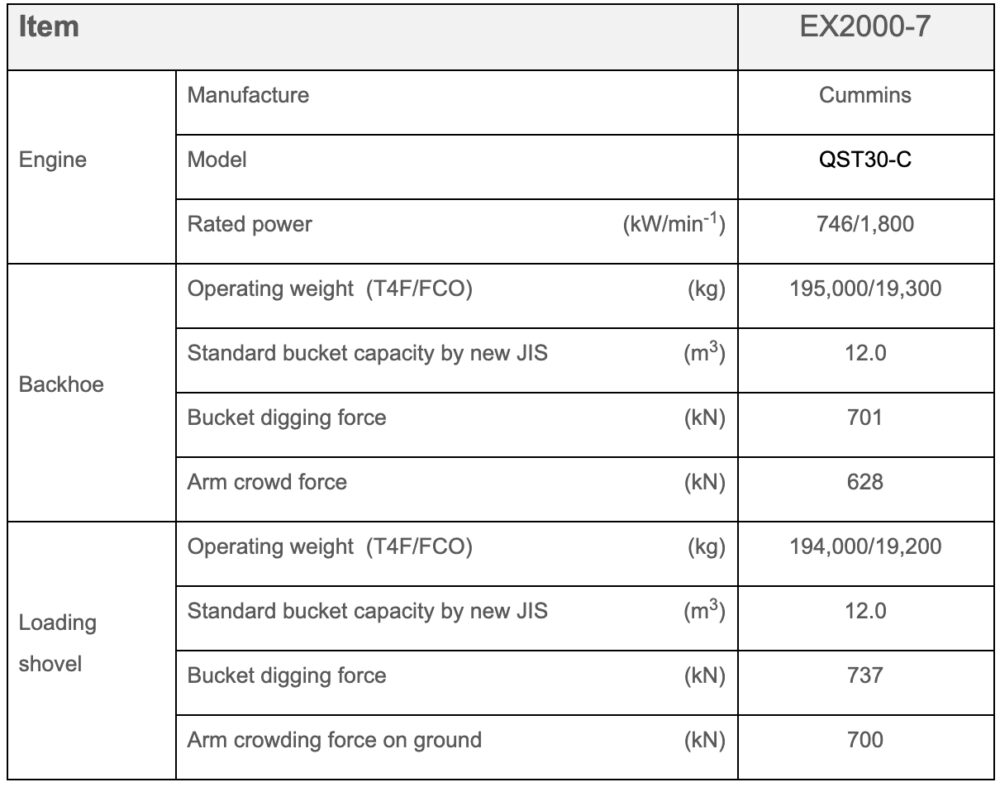Hitachi Construction Machinery announced that the company will launch the Hitachi EX2000-7 ultra-large hydraulic excavator in October 2021. The EX2000-7 is remodeled from EX1900-6 and consumes up to 19% less fuel while maintaining the same productivity. An entirely new hydraulic circuit will reduce fuel consumption by up to 19% with no loss in productivity.

EX2000-7 has high durability of structural parts achieved by the design employed on the current EX-7 series machines and it can incorporate support services for repair works and inspections based on ICT and IoT. In addition, it achieves higher fuel efficiency due to an entirely new hydraulic circuit, an addition of a work mode selection function, etc. Because of drastic cutbacks in fuel consumption, the machine contributes to the reduction of environmental impact and the life-cycle cost.
Since the first large hydraulic excavator UH50 (operating weight: 159 tons) was launched in 1979, ultra-large hydraulic excavators by Hitachi Construction Machinery have worked at mine sites throughout the world. Also, Hitachi has provided solutions such as mining equipment utilizing ICT and IoT and operation control systems to address challenges faced by customers such as improvement of safety and productivity and the reduction of life-cycle costs.
At an operating weight of 193 tons, the EX2000-7 is one of the smaller Hitachi EX-7 ultra-large excavators, high demand is expected from small-to-medium-sized mining and quarrying operations, to whom fuel efficiency is critically important.
The EX2000-7’s 19% fuel saving has been achieved through a range of newly designed, energy-efficient features that have made the engine more compact while retaining the same level of productivity. When compared with its predecessor, the EX1900-6, the EX2000-7 can save as much as 460 tons of CO2 emissions per year per machine.
Features of EX2000-7
Hydraulic oil flow is controlled according to the operating pattern and front-end attachment geometry
An all-new hydraulic control system has been developed and, for the first time, employed for an ultra-large hydraulic excavator which allows more precise management of the hydraulic oil flow in each control valve throughout the digging and loading cycle.
In the operation of a hydraulic excavator, the operator finely adjusts the boom, arm, bucket and swing speed with the operating levers to quickly bring the bucket to the digging position after digging and loading mineral ores or other materials to a dump truck. Under this scenario, a conventional hydraulic circuit would return unused or excess oil circulated throughout this cycle from the hydraulic pumps back to the oil tank, which constituted a loss of energy and presented a room for improvement. In the EX2000-7’s new hydraulic circuit, the oil flow rate to each cylinder (for boom, arm, or bucket) and swing motor is independently controlled for each operational pattern such as excavation, swinging or dumping and the load to the front-end attachment to optimize the energy efficiency of the system. Thus, fuel consumption is kept as low as possible.
An all-new hydraulic control system has been developed and, for the first time, employed for an ultra-large hydraulic excavator which allows more precise management of the hydraulic oil flow in each control valve throughout the digging and loading cycle.
Delivery flow rates of the hydraulic pumps are controlled by electronic regulators
Hitachi EX-7 excavator all hydraulic pumps are equipped with electric regulators to precisely control oil flow, based on operating lever positions and engine load. Fuel consumption is lowered by finely controlling the delivery rate of each pump according to the operating lever positions, which are controlled by the operator, and machine load.
Work Mode Selection Function
A new mode selection feature on the EX2000-7 now allows the operator to select one of three working modes – High Power (HP) Mode, Power (PWR) Mode or Economy (ECO) Mode – to optimize productivity and fuel efficiency for different types of operation. This feature has been applied to medium– and small-sized hydraulic excavators.
High Power (HP) Mode is suitable for heavy-duty operations such as bedrock excavation. It reduces fuel consumption by up to 19% with the same productivity as the EX1900-6. Power (PWR) Mode is suitable for most general operations. Fuel consumption is reduced by about 25% and productivity by 10% compared to the EX1900-6. Economy (ECO) Mode is suitable for light operations. Fuel consumption is reduced by up to 40% and productivity by about 30% compared to the EX1900-6.

Strengthening of the front-end attachment structures
The EX2000-7 boom-arm joint area and mainframes are now designed in line with Hitachi’s larger mining machines. The pin connection between the boom and arm has changed from a single pin to a double pin, which is employed for larger excavators (250 ton and heavier). This has made the boom and arms stronger and lighter, allowing for safer and easier pin replacement to help further reduce life-cycle costs. Following utilizing operating data the mainframe has also been redesigned by analyzing its stress condition to disperse stress as evenly as possible during operation, increasing durability of the machine.
Upgraded oil cooler and radiator by optimally controlling the rotating speed of the fans
On EX-7 series machines, the rotating speed of the oil cooler fan is increased in proportion to the increase of hydraulic oil temperature to cool the hydraulic oil. The speed of the radiator fan is controlled by taking into account both the ambient temperature and the engine coolant temperature. Through this innovation, thermal degradation of the seals of hydraulic components is prevented and cracking and scoring of their internal parts due to thermal expansion are also prevented. As a result, the reliability of the hydraulic pumps, the cylinders and the motors are increased and energy efficiency is also increased, contributing to a reduction in fuel consumption.
Far-reaching expansion of functionalities for supporting mining operations
ConSite Mine (scheduled for release in 2021) helps resolve problems at mine site efficiency through the use of IoT and AI (Artificial Intelligence) technologies. It will be available for the Hitachi EX-7 series to contribute to minimizing machine downtime and to the stable operation of machines. Additional to ConSite Mine, the EX2000-7 will come ready for the integration of a Remote Operation System, Operation Support System and Autonomous Operation function, all for which testing is scheduled to begin within the fiscal year 2021. In the future, Hitachi Construction Machinery will realize autonomous mining operations by coordinating hydraulic excavators and AHS (Autonomous Haulage System), which will enhance safety and productivity to a new level
The Hitachi Construction Machinery group announced that it will contribute to “Safety enhancement,” “Productivity enhancement” and “Reduction of life-cycle cost”, which are challenges faced by customers, as a close and reliable partner.
Basic Specifications

Source: Hitachi Construction Machinery


 Copyright 2017-2023 All rights reserved.
Copyright 2017-2023 All rights reserved.